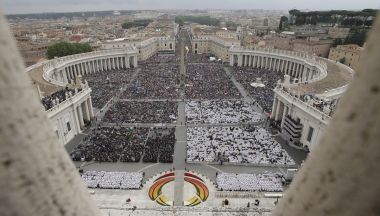Vatican: 'End of Communism was not all good news for churches'

The end of communist rule in Europe, which began 25 years ago this month, was not all positive for Christianity because it brought tensions between Rome and Russia back to the surface, a senior Vatican official said on Monday.
Cardinal Kurt Koch, the top Roman Catholic official for inter-church relations, said the re-emergence of Eastern Catholic churches in Ukraine and Romania after decades of suppression had created major tensions with the Russian Orthodox Church.
Russian Orthodox leaders have accused the Vatican-aligned Ukrainian Greek Catholic Church of trying to take back churches and woo away believers from the Moscow Orthodox Patriarchate. The Ukrainian church and the Vatican deny this.
Moscow prelates cite this as a hurdle to closer ties between the Orthodox and the Catholic Church, which for decades prayed for the conversion of the Soviet Union only to see the newly resurgent Russian Orthodox Church become a difficult partner.
"The changes in 1989 were not advantageous for ecumenical relations," Koch told Vatican Radio. "The Eastern Catholic churches banned by Stalin re-emerged, especially in Ukraine and Romania, and from the Orthodox came the old accusation about Uniate churches and proselytism."
"Uniate" refers to eastern churches with Orthodox-style liturgies that recognise the pope as their spiritual leader.
Pope Francis will meet Ecumenical Patriarch Bartholomew in Istanbul late this month. The Orthodox spiritual head supports more cooperation with Rome, but cannot ignore the wary Russians, who make up two-thirds of the world's 300 million Orthodox.
Koch, who spoke a week after the 25th anniversary of the Berlin Wall's fall, and on the same day as Czechs marked the start of their democratic revolution, noted that talks on closer ties between Catholic and Orthodox theologians were suspended between 2000 and 2006 because of tensions between the two sides.
"There are always setbacks, but I'm convinced we can make more progress," the Swiss-born cardinal said.
Persecution of Christians in the Middle East has brought Catholics, Orthodox and Protestants there together, he said, but the Ukraine crisis has heightened tensions among churches.
"We've repeatedly heard major complaints from the Russian Orthodox," he said. "This is unfortunate because churches are supposed to be a factor for unity and reconciliation."
Metropolitan Hilarion, the number two man in the Moscow Patriarchate, used his guest presentation to a Vatican synod on the family last month to accuse the Ukrainian Greek Catholic Church of trying to poach believers from Orthodoxy.
(Reuters)











